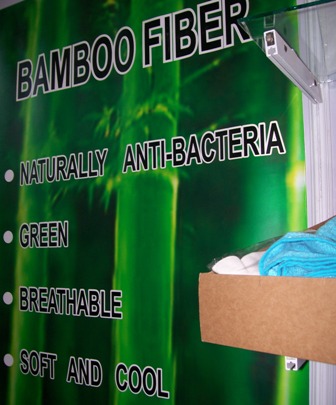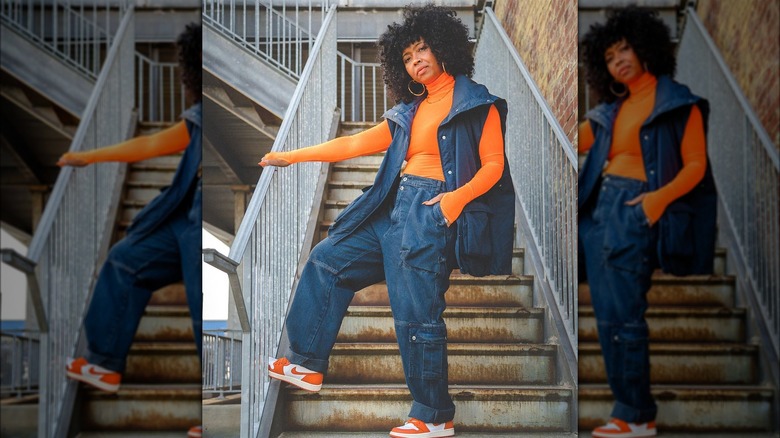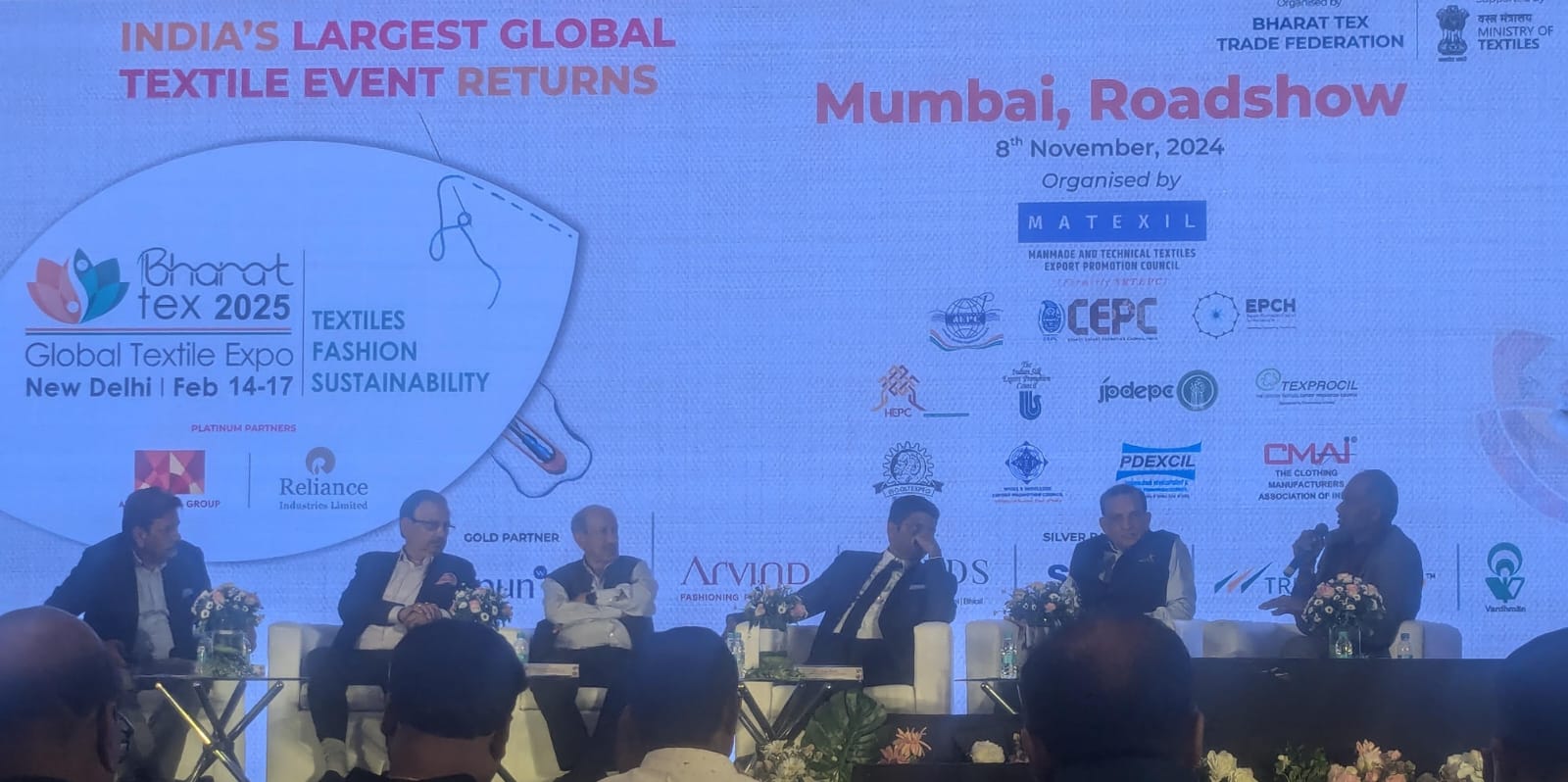FW
Karl Mayer is expanding its multibar Jacquardtronic Lace series of machines with the incorporation of MJ 65/1B. The multibar Jacquardtronic Lace series also unveiled its MJ 42/1B machine at ShanghaiTex 2013. It was launched at the same time as the MJ 59/1B, the version with more guide bars. Both machines are based on the company’s extensive experience with tried-and-tested ML technology but, by equipping them with a jacquard bar, lean more towards the production possibilities of the Jacquardtronic Lace.
With their exceptional cost and benefit ratio, the models in the new MJ series give Karl Mayer’s customers considerable competitive edge and are therefore, in great demand. Spurred on by its success, the company has also been offering a high-bar option in the shape of the MJ 65/1B since December last year.
Increasing the number of guide bars has enabled an even greater range of patterns, full-width fabrics to be produced efficiently in the crosswise direction, and wide bands to be manufactured. The cost and benefit ratio of the MJ 65/1B has been optimised, which is said to make it an extremely attractive proposition for all lace manufacturers, both in the lingerie and outerwear sectors.
The Trayton Group from China has selected Lectra’s Versalis and Vector, together with product development, pattern-making and nesting software, to automate and optimize its production. Trayton is one of China’s top furniture manufacturers. It has factories in Shanghai and Zhejiang and has more than 2,000 employees. Leather accounts for 80 per cent of the company’s production, with the remaining 20 per cent in fabric. About 90 per cent of total production is for exports. Its goal is to become a market leader in lifestyle products in China and internationally.
Lectra consultants worked closely with the company to pinpoint and prioritize the group’s needs, looking at processes and working methods. Meetings were also held with Trayton’s service team to ensure that the actual implementation went very smoothly. In addition, Lectra was able to make recommendations on optimizing the entire production chain, from pattern making to cutting. Lectra is focused on bringing measurable added value to Trayton, not only in terms of productivity, but also in terms of process optimization, sustained performance and continuous improvement.
Lectra is the world leader in integrated technology solutions dedicated to industries using soft materials—fabrics, leather, technical textiles and composite materials.
The Taiwan Textile Federation (TTF) has expressed serious concern over the violent demonstrations in Vietnam. A dispute between China and Vietnam over the South China sea has resulted in a series of anti-Chinese agitations in Vietnam. In the process, many Taiwanese plants in Vietnam and office buildings have been mistaken for Chinese-owned plants and were vandalized. Taiwan wants the Vietnamese government to end such incidents.
Trade relationships between Taiwan and Vietnam have been strong and close. Taiwanese investors have been putting in money in Vietnam’s textile sector since 1980. Vietnam is Taiwan's second largest export market in textile products. Taiwan’s exports of textile products to Vietnam in 2013 accounted for 16 per cent of Taiwan’s textile exports. TTF has appealed to Vietnam’s government to value the bilateral trade relationship established for ages. It has requested Vietnam to help Taiwanese companies defend their safety and property.
The Taiwan Textile Federation, established in 1975, provides a versatile range of services, including market promotion, industrial development, information, and help with the improvement of design capability et al.
ttf.textiles.org.tw/
Pitti Uomo, the specialized menswear show will take place from June 17 to 24, 2014 in Florence. Several events have been lined up like: ‘Firenze Hometown of Fashion’ marking the 60th anniversary of Centro di Firenze per la Moda Italiana;
On June 16, a concert will be organized of singer Andrea Bocelli; and a special party celebrating Ponte Vecchio, the historical landmark bridge across the Arno river and a symbol of the city.
The highlight of the celebration will be the ‘Born in Florence’ initiative that will showcase four important designers and fashion labels, such as Salvatore Ferragamo, Gucci, Emilio Pucci and Ermanno Scervino. A series of events will see these designers as protagonists of cultural events throughout the city during the Pitti Uomo. Exhibitions, concerts, fashion shows and many other events will focus on Italian excellence and craftmanship.
The overriding theme inspiring the Pitti Immagine Uomo event taking place inside the Fortezza will be ping-pong, or ‘Ping Pitti Pong’. As previously announced, Z Zegna will be the menswear guest designer of the show. The group will return to Florence after about six years. Other initiatives will involve collaborations between Pitti Immagine and other Italian trade shows. During the July 2014 edition of Pitti Filati, the ‘Denim Italiano Italian Denim Makers’ event will involve Italian denim companies, which will also be presented as a teaser at the June edition of Pitti Uomo and later relocate to Milano Unica in September.
Other events will include the launch of G-Star’s special ‘G-Star Raw for the Oceans’ project in collaboration with Pharrell Williams. Ron Herman will launch its new international collection. Valstar will announce its latest collaboration with United Arrows and Tiger Jay X North Sails collection will make its debut. As part of the Pitti Italics events, two brands – Marcelo Burlon County of Milan and Au Jour le Jour, will mark their debut.
www.pittimmagine.com
Pakistan will unveil its textile policy for 2014-19 on June 30, 2014. The policy envisages textile exports of over $26 billion in the next five years and has maximum incentives for the value-added textile sector.
The Textile Ministry has proposed major incentives for value-added textiles sector, including giving 6 per cent subsidy on the import of textile machinery and reducing the interest rate to 8 per cent against the current 12 per cent for new investors to attract more investment and enhance textile exports. The main focus would be on the value-added sector. Major incentives have been proposed for the sector to achieve the desired results by raising textile exports. Technology upgradation schemes would also be one of the prime objectives, as these would encourage investment in shuttle-less looms and in the apparel sector.
Pakistan has registered 8 per cent increase in textile exports since getting the GSP plus status and the country is confident of achieving its textile export targets. A cotton seed bill will also be introduced. It has been pending for the last 12 years. The main focus of the seed bill would be on improving cotton seed and production as it is like a white gold and can play a major role in the economic growth of the country.
Nepal’s readymade garment sector has shown a sharp increase in exports as peace and political stability have convinced foreign buyers to return. Demand from abroad has instilled confidence in garment entrepreneurs. The country’s readymade garment sector is one of the largest export sectors in terms of foreign exchange earnings. It provides significant employment opportunities but was almost on the verge of collapse. That has changed in recent months.
Readymade garment exports from Nepal have increased by 52.8 per cent in the first eight months of the financial year. Yarn exports, especially cotton, polyester and other yarns for the eight month period, improved by 6.1 per cent and fabric exports increased by 5.9 per cent. Woolen and pashmina shawls exports increased by only 0.6 per cent.The major countries Nepal exports garments to US, Canada, Europe, Australia and India. Within Europe, the key garment importing countries are Germany, France, Netherlands, UK, Spain and Switzerland.
The US was the main buyer of Nepali garment products until 2005. But after the end of quota system, Nepali garment products lost their competitive edge, eventually losing the US market. Although India was emerging as the next growth market for Nepali garments, the countervailing duty imposed on the product by India resulted in a drop in garment exports to India.
Europe has now emerged as the major market for Nepali garments.
Tau Investment Management will invest $200 million in the readymade garment and textile industries of Bangladesh. Tau Investment Management is a US private investment firm. It infuses capital into textile factories of various countries to address their social, environmental and efficiency issues. The group has a $1 billion fund. It has now launched Tau Bangladesh and plans to set up a regional office in Hong Kong to provide a hub from where it can target the textile industries of Indonesia, Cambodia, Vietnam, China.
Tau plans to acquire minority stakes in factories and to be an active owner. Modernisation and transformation of the country's apparel and textile industries will be the prime focus of its Bangladesh investment plan. It is ready to invest in a few garment makers that generate annual sales of over a $100 million and will provide them world-class expertise along with access to low-cost financing sources.
For Bangladesh, Tau aims at improving the supply chain of target companies through upgrading and de-risking textile supply chains, and intends to make the companies attain international standards in terms of becoming socially responsible and compliant.
tau-investment.com/
Mauritian textile and apparel manufacturers hope the AGOA trade preference program will be renewed. AGOA (African Growth and Opportunity Act) is set to lapse in a year. It provides duty-free entry into the US for certain goods. The act came into force in 2000. It aims to assist the economies of sub-Saharan Africa and improve economic relations between the US and the region.
The program has expanded market access for textile and apparel products into the US for eligible countries. Mauritius, in particular, is one of the leading beneficiaries of the AGOA provisions. Mauritius is the fourth-largest exporter under AGOA, exporting primarily apparel products.
The trade deal helped Mauritius grow its exports to the US. It is the country's second largest export market behind the UK, accounting for around 18 per cent of textile and apparel exports in 2013. For many Mauritian manufacturers, the US is not only an important customer but in some cases accounts for their total business. The benefits Mauritius gets from its EU trade deals are more challenging, with duty set at around 10 percent. The benefits Mauritius has through the AGOA deal make the US a more appealing market to trade with.
trade.gov/agoa/
Bayer has developed a complete product range for a large number of synthetic leather and specialty coated textile materials. These can be used in footwear, apparel and accessories for fashion and sport, in automotive interiors and in diverse technical and industrial applications. The company has more than 75 years of experience in polyurethane development.
In recent years, Bayer has focused its development of products for textile applications in the area of waterborne polyurethane dispersions – coating materials that do not utilize solvents. The products have now reached such a stage of development that they give synthetic leather and coated textiles producers an enormous range of possibilities of hand feel, look, mechanical and chemical durability, while at the same time permitting the conversion to manufacturing processes that don't use solvents and may also consume less energy and less water.
Recognizing the increasing pace of change in the textiles industry, Bayer realigned its approach to the market, creating a global team of textile industry experts dedicated to serving this sector. The company also counts on multi-purpose pilot coating line facilities that make for a strong material development capability that benefits textile manufacturers and the different industries that consume textiles, from fashion and sports to automotive and other industries.
www.bayer.com/

Talking about the company, Sachin Doshi, Director, Tenbro says, “Tenbro manufactures natural fibres. The President of Tenbro is also the President of New Fibre Manufacturing Association in China. We work with a lot of brands globally and now will be working with the Tata Group.”
Natural fibres gain traction
Tenbro fibres are made from Bamboo. These are naturally antibacterial because 
There are other natural products made from soyabean, corn, milk, banana even pineapple. Those are expensive and not commercially viable. “We are doing products that are commercially accepted. In India, we are doing well. Our clients include Trident, RSWGM, Welspun and Pallava, among others,” Doshi informs.
Export potential of Bamboo
Doshi believes bamboo exports will definitely increase with time. Earlier, the US had major problems accepting it. “We made a presentation explaining the difference between viscose and Bamboo fibre. Now, acceptability is increasing. No more do they claim that we are supplying viscose in the name of bamboo fibre,” he adds.
Talking about the difference, Doshi says, viscose is a process. “What’s important to note is the pulp used during the process. In viscose, we have to use soft wood pulp. Some use Eucalyptus pulp but the trees take a lot of time to grow. We use bamboo, which grows fast. So it is more convenient, natural and doesn’t harm the environment since the replacement process is faster in Bamboo cultivation,” he elaborates.
www.tenbro.com












